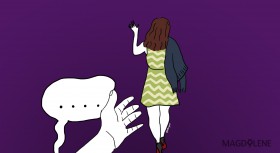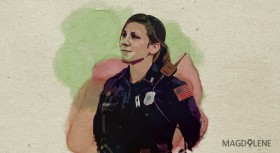Since I found and learned about feminism, pluralism, and a bit of socialism, I have always tried to be “progressive”. In Indonesian, the literal translation is “berkemajuan” (to make progress), but I believe that the meaning is better explained in a sentence from Pramoedya Ananta Toer, one of Indonesia’s greatest authors: that being fair starts from the mind before manifested in our deeds.
And that’s what I’ve been trying to do. I’m enthusiastic about SRHR (Sexual and Reproductive Health Rights) because it’s only fair to empower people with the authority and respect over their own body. I mostly disagree with religious conservatism because it tends to refuse to open up to many possibilities as well as different perspectives. And I often dislike religious conservative people because of the way they impose their strict values, based on ancient teaching on morality, on others.
But one day something happened that forced me to confront my own prejudice.
It was a rainy afternoon and I was sitting in a crowded public city bus, coming home from work in an area where I used to attend med school. A girl sat next to me. At first glance I knew that she was a religious conservative – an ukhti, a conservative young female Muslim. She wore a long green loose tunic, a long veil that covered her head and almost her whole upper torso, a pair of arm covers to prevent any part of her skin from peeking from under her loose sleeves, and socks. When most of the passengers dozed off in the heavy traffic, she opened a small book and recited verses from the Quran silently.
Somehow being in close proximity to someone like her always makes me uneasy. Maybe it’s because in my mind I could see judgmental words displayed across their foreheads, making the rest of us feel unclean. Or maybe it’s because I’ve started to develop a chronic allergy to the idea of conservatism itself. I know how prejudice I sound, but it’s not as if I do this intentionally. I don’t associate Muslims with terrorism like Trump’s America. Nor do I find the teaching of Islam ridiculous, like some people I know. It was conservatism, as represented by the girl’s physical appearance that made me uncomfortable.
When our bus was just about to enter the highway, a middle-aged busker with a battered ukulele climbed in. He stood at the front of the bus and, while waiting for a chance to sing uninterruptedly on the highway, he helped the driver collect new passengers.
He then began to talk with the driver about his life and his children, particularly about a daughter he was really proud of. His daughter, he boasted, was really smart. She had managed to get into a favorite public senior high school in their district, although her father didn’t have that much money. He dreamed of being able to get her into some decent public university in a couple of years, and that was why he was still out at that time of the day, trying to earn a little money, despite having a sore throat.
So he sang a couple of patriotic and old pop songs to us with his hoarse voice. When he finished, I scrambled to find some coins in my purse. We were already out of the highway, and some people had begun to alight. Next to me, I saw the ukhti took a red bill – Rp100,000 (about US$7). I felt sorry for her, thinking the driver would have a hard time getting her change with all the crowd getting out of the bus.
The singer started to circulate a plastic bag to collect money among the passengers. I put my coin inside. To my surprise, the ukhti put the red bill inside the bag.
Now let me confess here: I always associated religious conservatism with a holier-than-thou attitude. They seem to care only about the afterlife, about getting to with other people who think like them. They have cared little for what happens here on earth. Compared to liberalism and humanism, which aim to give people freedom, respect, and basic rights, regardless who and what they are, this kind of attitude seems illogical, if not unfair, and unkind.
In this practical society, we tend to value logic over anything else, including empathy. That was what I did that afternoon: I counted how much I had at the time, then I decided how much I would give. The most disturbing thing is I knew that I would never, ever, consider giving that much for a busker on a bus, even if I did have enough money. A Rp5,000 bill, maybe, if I felt really generous. But Rp100,000 straight into the bag? Out of the question. It wasn’t worth it.
But the ukhti did it. While I might argue that I could not afford to give the same amount because I was no billionaire, she didn’t look like one either. She looked like any ordinary university student. Her simple deed left my thoughts whirling and made me feel shameful in the days that followed.
She reminded me of a story in the New Testament about a widow and her tributes in the House of God in Jerusalem. The widow was a very poor old lady; she only had two coins in her belongings and nothing else. Still, she walked to the tribute box and put both coins inside. How did she find the generosity to do that? And where did the ukhti’s generosity come from?
I’ve seen other examples of supposedly progressive people failing to show empathetic efforts about certain issues, only adoring their cold logic instead. Like when they were showing support for a politician whose policies included evicting people out of places they’d call home for years.
While city development and flood issues are not unimportant, it is too easy for us to point our middle-class fingers to the less privileged people, branding them lawbreakers who deserved what was coming, or accused the parties who tried to defend their rights as political competitors. We failed to facilitate a fair dialogue and come up with a win-win solution.
Maybe most of us become progressive because we were more privileged from the start. We can afford proper educations, read better books, access a lot of information without having to worry about what to eat today. We sometimes forget that true freedom doesn’t only mean being free to choose, but also being empowered enough to actually access the availability of choices.
Our job as the luckier ones is to help others who are not so lucky to reach that state of being empowered. Like the street singer’s daughter – her father might not be privileged enough, but who knows how far she might go one day with good education?
I used to think that religion kept us in shackles, but I’ve been reminded that day that while there are things about religion that should be criticized, religion and liberalism do have something in common. When applied properly and with consistent efforts to rid ourselves of our selfishness, both could teach us a lot about empathy. About being human. About humanizing others. About fairness, and being kind, and love.
And if that is not what it means to be progressive, I don’t know what is.
Putri Widi Saraswati is a feminism and writing enthusiast. She’s not a big fan of how people impose their concept of morality on others today. Unfortunately, she’s a medical doctor – the one profession that morality cannot let go.








Comments